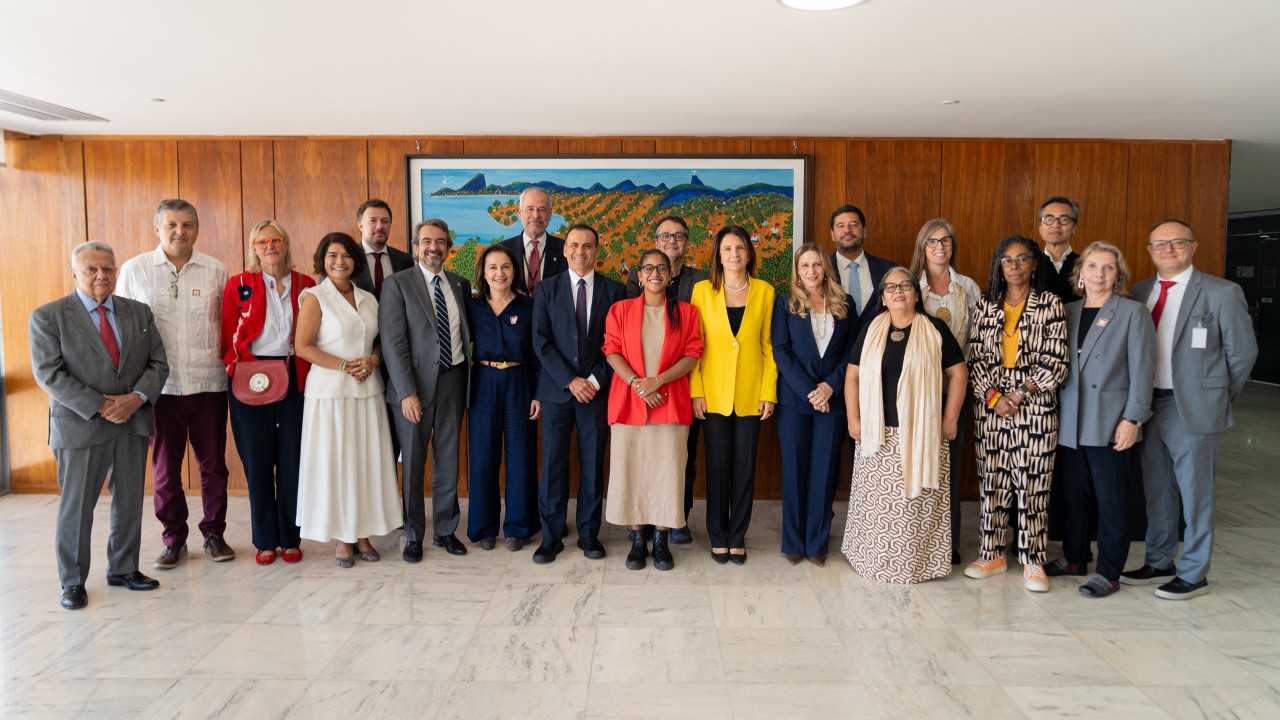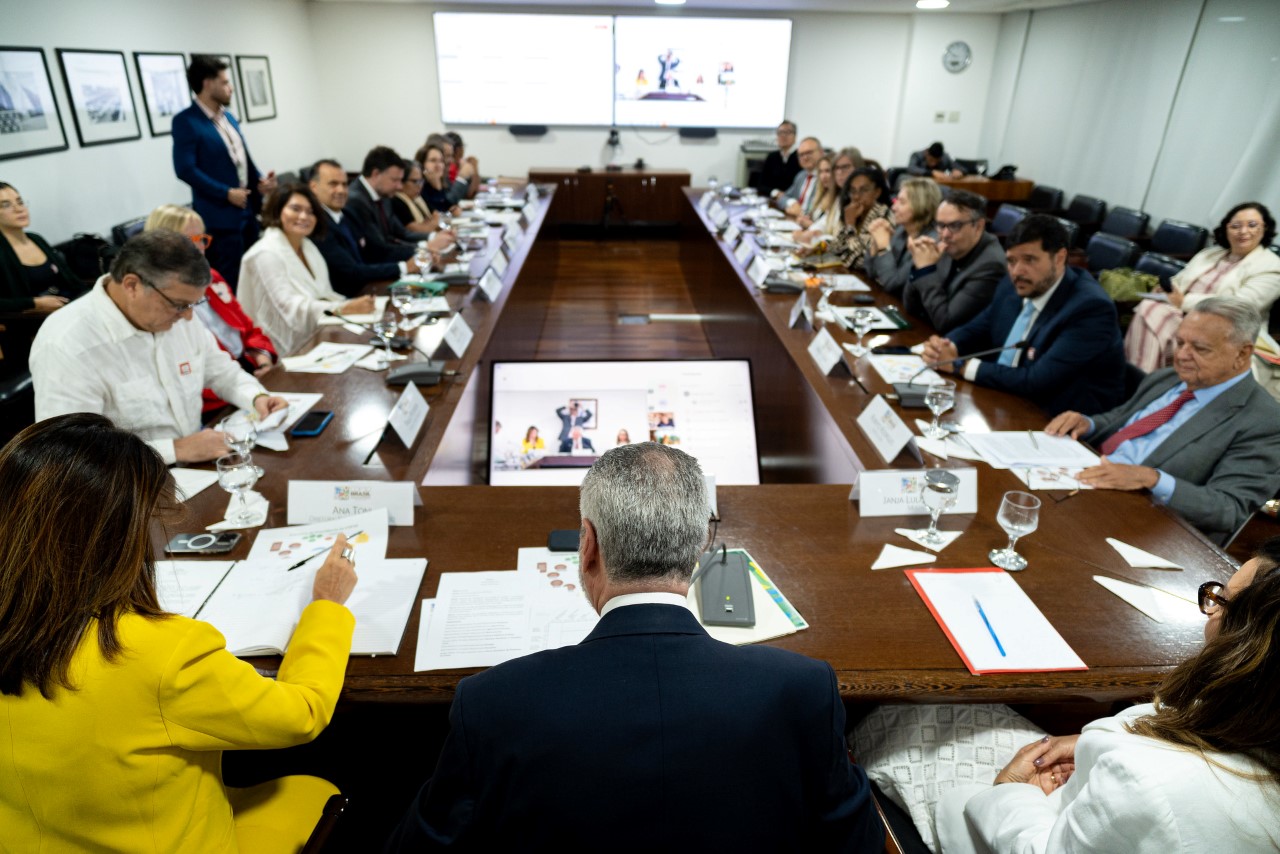COP30 sectoral envoys strengthen the “Global Mutirão” and seal the pact for integrated climate action
The meeting was held at the Planalto Palace with the COP30 Presidency. This marks the start of collective efforts by volunteer representatives working towards the upcoming conference in November, with an agenda driven by active listening, thematic diversity and collaborative development

By Franciéli Barcellos de Moraes / francieli.moraes@presidencia.gov.br
On Friday, May 23, at the Planalto Palace in Brasilia, efforts were made to promote diversity and outreach to various segments of civil society, reinforce citizenship values, and improve the quality of thematic debates. These efforts summarize the role of the 22 sectoral envoys of the 30th United Nations Climate Change Conference (COP30). The envoys work alongside the COP30 Presidency.
The meeting marked the first formal interaction between the conference presidency and the sectoral representatives, fostering transparency and trust in the process. It was also an opportunity to listen actively to social demands, expand possibilities for action, and coordinate agendas. Both the President of COP30, Ambassador André Corrêa do Lago, and the CEO, Ana Toni, evaluated the meeting positively.
"The environment was even better than we imagined, and we have a dream team to support the Brazilian presidency in preparing for COP30," the ambassador emphasized. His colleague echoed this sentiment. "This meeting far exceeded my expectations. It was interesting to see the quality of the envoys and the “” approach they are showcasing in their roles,” Toni said.

"They are, I would say, the embodiment of the “Global Mutirão”. They demonstrate that anyone can be part of this movement because if you are not part of the solution, you are part of the problem. I believe all the sectors represented here are part of the solution and can do more," the CEO concluded.
Since most issues affect multiple sectors, the meeting also served as a space for the envoys to exchange ideas. The envoys act as general representatives for the themes on a voluntary basis and in a personal capacity, not as representatives of specific organizations. Examples include a just transition for workers in the energy, union, and business sectors; payment for ecosystem services in the bioeconomy, forestry, and indigenous communities; and addressing environmental racism in urban contexts in relation to human rights, racial equality, urban peripheries, and urban solutions.
The COP30 President acknowledges this. "It was interesting to see the willingness to understand each other across sectors. We agreed that there are many isolated groups that need to work together to develop collective solutions. That is the key concept of the “Mutirão”: everyone doing what they know how to do in collaboration with others for the sake of the collective,” he said at the end of the meeting.
"We agreed that there are many isolated groups that need to work together to develop collective solutions. That is the key concept of the “Mutirão”: everyone doing what they know how to do in collaboration with others for the sake of the collective"
The meeting took place one week after the names, profiles, and areas of work were announced, and the full announcement can be viewed here.
What the envoys say
Jurema Werneck, the envoy for racial equality and marginalized urban communities, emphasizes the importance of tangible Black participation rather than just a brief mention of it in official documents. "The demands are longstanding and urgent. Environmental racism must be taken seriously. This means recognizing the racial 'sacrifice zones,' where fatalities are already occurring due to extreme heat, heavy rains, food insecurity, and other consequences of the climate crisis," says the executive director of Amnesty International.
Philip Yang, the envoy for urban solutions, emphasizes the importance of addressing cities alongside forests in order to find the most effective and rapid solutions to climate change. "Cities offer the most efficient ways to reduce greenhouse gas emissions, so it's crucial to discuss them. For instance, 80% of the world's energy consumption and greenhouse gas emissions occur in urban areas. Therefore, there are many direct paths that can be explored for more effective reductions,” says the entrepreneur and activist.
Sinéia do Vale, the envoy for Indigenous peoples, emphasizes that indigenous territories are the best preserved in Brazil and around the world. She argues that indigenous rights must be guaranteed in all areas of the COP. "The main issue for indigenous peoples at COP30—which will be held in the Amazon and host the largest gathering of indigenous peoples from Latin America—is ensuring territory to address climate change," says the Wapichana indigenous leader.
Janja Lula da Silva, the envoy for women, emphasized that gender issues must be considered in all sectors and that women from the Amazônia must play a larger role. "I always talk about how climate change affects women's lives more drastically, but I've been reflecting: What are we doing to improve the lives of these women, especially in the Global South and the most peripheral territories, which are hit hardest? We must understand that this issue is transversal," said the sociologist and first lady of Brazil.
"Global Mutirão" — a collaborative governance model
These representatives play a key role in climate action efforts by translating global challenges into local realities and ensuring a two-way flow of information as direct intermediaries between the COP30 Presidency and various social sectors. As social participation increases, climate debates will reach a broader audience, and climate goals will have a better chance of being understood, supported, and effectively implemented.
This is another step in the "Global Mutirão" initiative, which aims to inspire a global movement that values local actions. Subnational governments, the private and financial sectors, social movements, and individuals are invited to contribute to this initiative collectively, immediately, and autonomously.
The “Mutirão” aligns with Brasil's approach in international arenas, such as its recent G20 Presidency and current BRICS leadership. In these roles, Brasil has promoted a collaborative governance model to strengthen multilateralism, which is crucial for effective climate adaptation and mitigation actions requiring global agreement and implementation.
In addition to the envoys, who are part of a permanent group that exchanges ideas, experiences, and suggestions, the “Global Mutirão” is supported by four leadership circles: the Global Ethical Stocktake (GES), the Circle of Finance Ministers, the Circle of Peoples, and the Circle of Presidents. These circles will work on specific fronts and outputs in support of the COP30 Presidency.
English Version: Trad. Bárbara Menezes
Proofreading by Enrique Villamil
